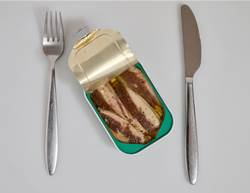We all have the best intentions to achieve great things and improve our health. We want to get fit, eat better, spend more time outdoors, and not waste time binge-watching the same TV series for the tenth time - we’ve all started the year with the resolutions to change die-hard habits.
We're very good at setting ambitious goals, but we're not so good at sticking to them. So, how can we ensure we break this pattern for good?
According to research by MyFitnessPal, over 3/4 of Australians have already given up on their resolutions by this point of the year and 61% admit to repeating the same resolutions year after year. This tells us that we need to approach health goals with a more balanced mindset. Striving to improve your lifestyle, whether it is losing weight, exercising more or eating healthier, should always account for the unpredictability of everyday life.
Creating lasting habits
Here are my top 10 tips to help you create sustainable and lasting change (that you’ll actually be able to stick to).
1. Start small and build gradually
While the cold turkey approach works for some, making drastic overnight diet changes is often unrealistic and can quickly become overwhelming. Instead of an all-or-nothing mindset, focus on making one small adjustment at a time. For example, add an extra serving of vegetables to your dinner or swap your afternoon sweet treat for a piece of fruit. Over time, these small, manageable changes will accumulate, and you'll have built long-lasting habits without even noticing.
2. Prioritise Whole, Nutrient-Dense Foods
Let’s change the way we think. Instead of focusing on what to cut out of your diet, think about what you can add to it. Whole, nutrient-dense foods like lean proteins, fibre-rich vegetables, healthy fats, and whole grains will provide the essential vitamins and minerals your body needs while keeping you full and energised. You can even use tools like MyFitnessPal to track your nutrition and ensure you're getting a balanced intake. Making additions rather than subtractions will help you break free from restrictive diets, fostering a sustainable eating pattern that supports long-term health.
3. Make Healthy Choices Convenient
Modern life is busy – trust me, I know. Sometimes it’s easier to grab the most convenient food options when we’re hungry and short on time, even if they aren’t the healthiest. To set yourself up for success, keep nutritious snacks like pre-cut fruit, yoghurt, nuts, or hummus easily accessible for those rush-hour moments. Meal prepping and batch cooking can also save you time and reduce the temptation to choose fast food or unhealthy snacks. Having healthy meals and snacks on hand makes it easier to choose nutritious options, even on your busiest days.
4. Balance, Don’t Ban
We've all been there – cutting out foods we love in the name of dieting, only to be overwhelmed by cravings and overindulgence. Instead of forbidding your favourite treats, allow yourself to enjoy them in moderation. Practising balance means that while most of your diet consists of nutrient-dense foods, there’s also room for occasional indulgences. This approach helps prevent feelings of deprivation and adds flexibility (because you’re human, not a robot!), making healthy eating more sustainable in the long run.
5. Listen to Your Hunger and Fullness Cues
How many times have you opted for a snack when you were probably just a little bit bored? It’s important to check-in with your body and understand your hunger cues, assessing when you’re genuinely hungry and eating until you’re comfortably full. Taking the time to slow down and eat mindfully can help prevent overeating and keep your goals on track.
6. Stay Hydrated
It’s easy for dehydration to be mistaken for hunger, which might lead to unnecessary snacking or overeating. Staying hydrated is key for overall health and appetite regulation. Aim for at least 2 litres of water per day (more if you’re physically active or live in a hot climate like Australia!). If you want to spice things up a bit, try infusing it with fresh cucumber, mint leaves, lemon, or herbal teas. Keep a reusable water bottle by your side throughout the day as a reminder to drink regularly.
7. Plan Ahead
After a long day at work, there’s nothing more draining than deciding what to make for dinner and resorting to the quickest, often unhealthiest option. To help combat the 7pm scaries, set out a bit of time before the week starts to plan your meals for the week, batch cook, and keep easy-to-assemble ingredients on hand. That way you’ll always have convenient and healthy options ready to go, but you won’t have to face the dreaded decision-making process, leaving you more time to relax.
8. Be Flexible and Forgiving
Nobody’s perfect, and neither is your diet. Life happens – sometimes we indulge in extra treats or miss a planned meal. Instead of feeling guilty, accept these moments as part of a balanced lifestyle and move forward without self-criticism. Flexibility is key to long-term success, and setbacks are temporary – not a reason to give up entirely. One less-than-ideal meal won’t derail your progress, trust me.
9. Find Healthier Versions of Your Favourite Foods
Whoever said you need to give up your favourite foods to be healthy was wrong, I promise. There are so many healthier versions of your favourite foods on the market. Love chocolate? Try dark chocolate for added antioxidants. Pasta lover? Opt for whole-grain or legume-based varieties. These small swaps can help you stay on track without feeling deprived.
10. Track Progress and Celebrate Wins
A great way to track your progress and eating habits is with an app or a food journal. Keeping a record of your patterns allows you to celebrate wins like increased energy, better digestion, and fewer cravings, which are all clear signs of positive change!
Sustainable diet changes are about progress, not perfection. By implementing the following tips, making balanced choices, and tuning into your body’s needs, you can build lasting habits that support your health without feeling restricted.
.jpg&h=630&w=1120&c=1&s=1)


.jpg&h=90&w=90&c=1&s=1)






